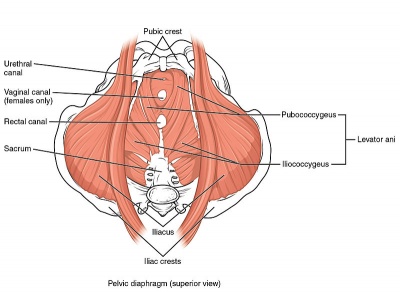Constipation
- Page is currently under construction, please check back soon for an updated page
Definition[edit | edit source]
Chronic constipation is infrequent bowel movements or difficult passage of stools that persists for several weeks or longer.[1]
Etiology[edit | edit source]
The prevalence of chronic constipation in North America 2% to 27%, the percentage varies because of the differing diagnostic criteria used.[2] Constipation may be described as disordered movement of stool through the colon or anorectum. Transit through the proximal gastrointestinal tract is often normal. Slowing of colonic transit may be idiopathic or may be due to secondary causes.
Secondary causes of constipation include:
| Potential causes of Constipation | |
|---|---|
| Neurologic disorders (peripheral) | Diabetes mellitus[3]Aganglionosis (Hirschsprung disease)[4] |
| Neurologic disorders (central) | Multiple Sclerosis[5]
Parkinson's Disease Spinal Cord Injury |
| Non-neurogenic | Anorexia nervosa[6]Pregnancy |
| Idiopathic | Pelvic floor dyssynergia[7][8][9] |
| Other | Irritable Bowel Syndrome[10]
Side-effects of drugs |
Clinically Relevant Anatomy[edit | edit source]
Please see the page "Pelvic Floor Anatomy," for further details regarding anatomy.
Clinical Presentation[edit | edit source]
An international working committee recommended the following diagnostic criteria (Rome IV) for functional constipation:[11]
- Must include two or more of the following:
- Straining during more than 25 percent of defecations.
- Lumpy or hard stools (Bristol Stool Scale Form 1-2) in more than 25 percent of defecations (figure 1).
- Sensation of incomplete evacuation for more than 25 percent of defecations.
- Sensation of anorectal obstruction/blockage for more than 25 percent of defecations.
- Manual maneuvers to facilitate more than 25 percent of defecations (eg, digital evacuation, support of the pelvic floor).
- Fewer than three spontaneous bowel movements per week.
2. Loose stools are rarely present without the use of laxatives
3. There are insufficient criteria for IBS. (See "Clinical manifestations and diagnosis of irritable bowel syndrome in adults".)
Although patients with functional constipation may have abdominal pain and/or bloating, they are not the predominant symptoms.
Management/Interventions[edit | edit source]
Education
Diet
Physiotherapist
Biofeedback can be a very useful tool for patients[7][8][9]
Physician
References[edit | edit source]
- ↑ Mayo Clinic. Constipation. Available from: https://www.mayoclinic.org/diseases-conditions/constipation/symptoms-causes/syc-20354253
- ↑ Suares NC, Ford AC. Prevalence of, and risk factors for, chronic idiopathic constipation in the community: systematic review and meta-analysis. The American journal of gastroenterology. 2011 Sep;106(9):1582.
- ↑ He CL, Szurszewski JH, Farrugia G, Soffer EE, Walsh RM, Ferris CD, Program EN. Loss of interstitial cells of cajal and inhibitory innervation in insulin-dependent diabetes. Gastroenterology. 2001 Aug 1;121(2):427-34.
- ↑ Edery P, Lyonnet S, Mulligan LM, Pelet A, Dow E, Abel L, Holder S, Nihoul-Fékété C, Ponder BA, Munnich A. Mutations of the RET proto-oncogene in Hirschsprung's disease. Nature. 1994 Jan;367(6461):378.
- ↑ Hinds JP, Wald A. Colonic and anorectal dysfunction associated with multiple sclerosis. American Journal of Gastroenterology. 1989 Jun 1;84(6).
- ↑ Zipfel S, Sammet I, Rapps N, Herzog W, Herpertz S, Martens U. Gastrointestinal disturbances in eating disorders: clinical and neurobiological aspects. Autonomic Neuroscience. 2006 Oct 30;129(1-2):99-106.
- ↑ 7.0 7.1 Rao SS, Valestin J, Brown CK, Zimmerman B, Schulze K. Long-term efficacy of biofeedback therapy for dyssynergic defecation: randomized controlled trial. The American journal of gastroenterology. 2010 Apr;105(4):890.
- ↑ 8.0 8.1 Chiarioni G, Whitehead WE, Pezza V, Morelli A, Bassotti G. Biofeedback is superior to laxatives for normal transit constipation due to pelvic floor dyssynergia. Gastroenterology. 2006 Mar 1;130(3):657-64.
- ↑ 9.0 9.1 Rao SS, Valestin JA, Xiang X, Hamdy S, Bradley CS, Zimmerman MB. Home-based versus office-based biofeedback therapy for constipation with dyssynergic defecation: a randomised controlled trial. The Lancet Gastroenterology & Hepatology. 2018 Nov 1;3(11):768-77.
- ↑ Longstreth GF, Thompson WG, Chey WD, Houghton LA, Mearin F, Spiller RC. Functional bowel disorders. Gastroenterology. 2006 Apr 1;130(5):1480-91.
- ↑ Longstreth GF, Thompson WG, Chey WD, Houghton LA, Mearin F, Spiller RC. Functional bowel disorders. Gastroenterology. 2006 Apr 1;130(5):1480-91.







